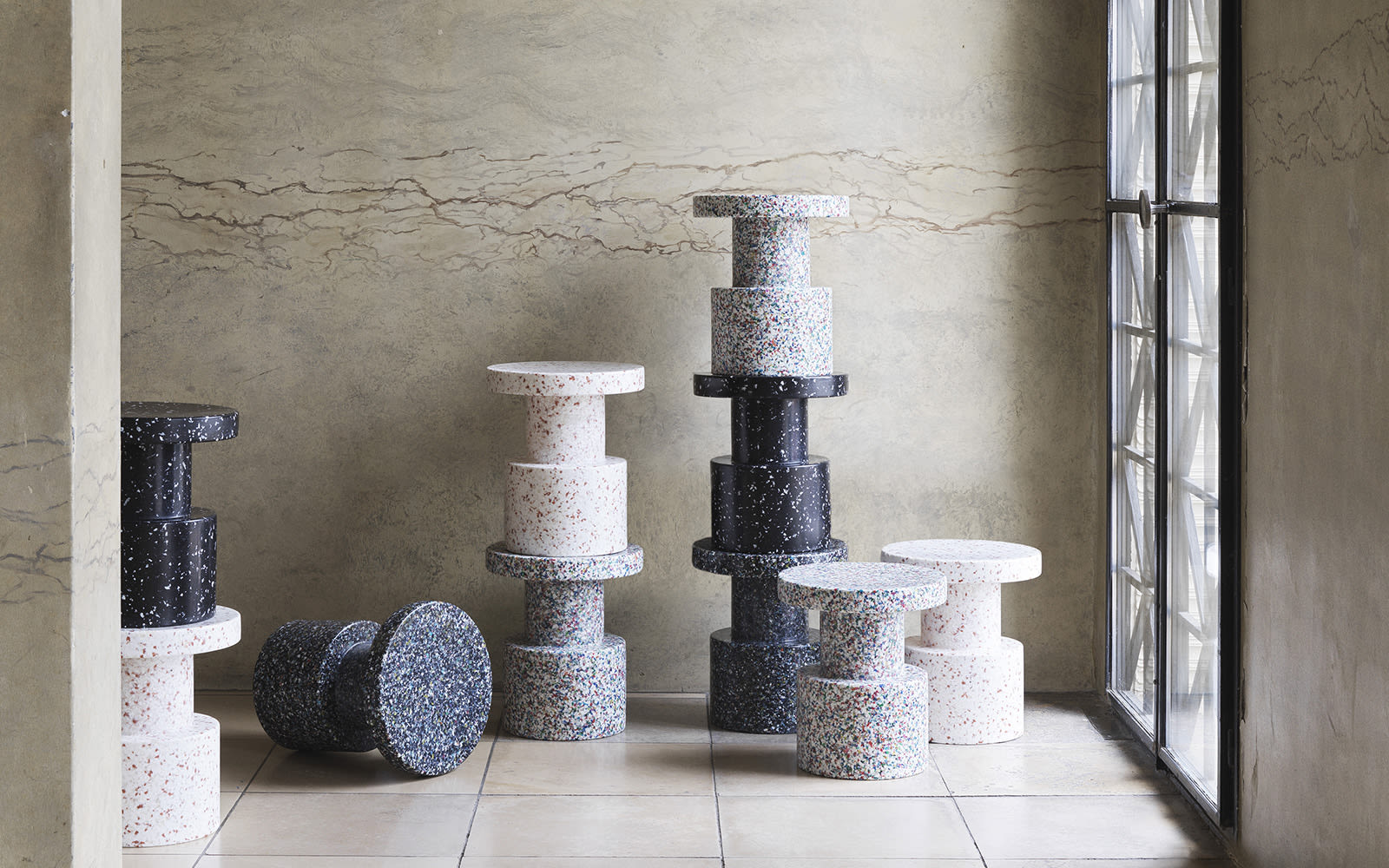Download the PDF Copy
Download
A Multifunctional Design that is a Bit More Resourceful
Bit by Normann Copenhagen is an aesthetically pleasing, versatile stool with countless possibilities for your home or office. Use Bit as a pedestal for a floral arrangement, as a side table for a lamp, or as impromptu seating for that unexpected dinner guest. Inspired by clear-cut shapes such as monoliths and columns, designer Simon Legald’s take on the stool is both bold and multifunctional.
Learn More About Bit
Interview with Bit Stool Designer, Simon Legald:
Q: Can you describe what sustainability means to Normann Copenhagen?
A: Sustainability is highly important to everyone at Normann Copenhagen, and we strive to create long-lasting designs, both in terms of aesthetics and durability.
We acknowledge the responsibility that comes with being a leading design company, and work on constantly bettering ourselves in order to contribute to a greener future.
Q: How are Normann Copenhagen products positively contributing to sustainable practices?
A: Our products are made to last. We hope their high durability and quality means that they will be passed on from generation to generation.
In 2021, we introduced a series of products made from plastic waste. Our Bit Stool has become an instant favorite and is an example of a truly circular product. We’re working on implementing more circular materials in our future designs.
Q: What is the design story behind the Bit Stool?
A: I wanted to create a stool that was multifunctional – that could just as easily be used as a side table or a pedestal for a lamp or vase as it could be used for seating. Another wish was to make it possible to use outdoors as well as indoors.
When introducing a new design, we spend a lot of time researching to find the best materials of the highest quality. I wanted the stool to be durable, but also highly sustainable. And so, we decided to try to make it from plastic waste. The production process is designed so that the material isn’t over-heated, allowing it to be scrapped and recycled after years of good use. The result is the Bit Stool: A circular and multifunctional design.
Q: What’s next for Normann Copenhagen’s sustainability journey?
A: Our sustainability journey is ongoing, and we will constantly reevaluate ourselves in our mission to become more sustainable. The entire organization is working on implementing more sustainable practices. As far as the design department goes, we’re working on some new, exciting sustainable products – but I’m afraid I can’t disclose any further information at this time. You will have to wait and see!
Interview with Allsteel Senior Product Strategy Manager, Andrea Gauss:
Q: Can you describe what sustainability means to Allsteel?
A: At Allsteel, we continuously look for new and better ways to positively impact the planet, operate responsibly, and contribute to our communities. We believe we can make a real and lasting difference and that our choices today will make for a better tomorrow. We understand sustainability doesn’t have an endpoint, and we’re working constantly to reduce our operational impacts and enact sustainable change. Initiatives like sourcing 100% renewable electricity, reducing our carbon emissions, and pursuing zero waste to landfill helps ensure we’re sustaining the environment
Q: What actions is Allsteel taking to make change in this area?
A: Allsteel’s current focus has centered on bringing operations to zero waste, driving carbon reduction strategies, and assessing materials for environmental and human health impacts. We source 100% renewable electricity annually and have reduced our total water consumption by 30% since 2018, saving over 45 million gallons of water. In 2020, we diverted and recycled more than 24,700 tons of waste and reduced our combined Scope 1 and 2 Green House Gas (GHG) emissions by 35%.
Q: How did you (Andrea) get engaged in sustainability work with Allsteel?
A: In my work around product strategy, it became clear that sustainability doesn’t “just happen” – we know sustainability has to be driven by more than corporate-held initiatives The passionate individuals across our entire enterprise possess a long-term vision that is part discovery and part muscle building. I get to help build that muscle across engineering, product management, research, and our supply chain as we collectively discover new technologies and information.
Q: What’s next for Allsteel’s sustainability journey?
We will continue to focus on driving waste out of our operations, reducing our carbon footprint, and assessing materials for environmental and human health impacts. These relevant initiatives represent a core part of our journey. Specific areas of focus for 2022 build on towards longer-term objectives:
- Removing all EPS from our packaging by 2025
- Reducing our Scope 3 GHG emissions by 40% per ton of goods sold by 2035
- Enhancing the sustainability leadership and decision making in our DfE (design for environment) processes
- Leveraging material transparency to make more informed, sustainable choices for products & packaging
- Continuing to support our client goals by renewing our BIFMA level 2 & 3 product certifications
- Driving a sustainable mindset across all our members and departments, regardless of position or focus










